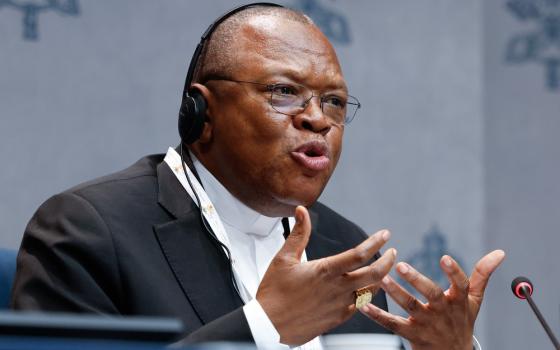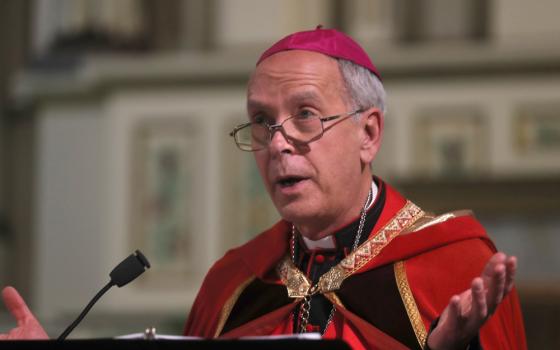By JOHN L. ALLEN JR.
Rome
Though the Vatican typically is loathe to put the pope in the position of endorsing a commercial product, in effect a papal thumbs-up is precisely what Mundell & Associates, an environmental consulting firm in Indianapolis, Indiana, can claim from Caritas in Veritate, Benedict XVI’s new social encyclical.
Founded in 1995, Mundell & Associates is a 20-person firm specializing in environmental clean-up and design; for example, it’s currently helping Ball State University convert its entire campus to geothermal energy. Directed by a Catholic couple, Mundell & Associates is also part of the “economy of communion” network of businesses linked to the Focolare movement.
The “economy of communion” was cited by Benedict XVI as a promising form of intermediate activity between for-profit business and classic non-profit institutions, rupturing what the pope called an “exclusively binary model of market-plus-state” which is “corrosive of society.”
That papal seal of approval should give “great credibility” to enterprises such as his own, said John Mundell, founder of Mundell & Associates, in a July 6 telephone interview.
“It will shed light on the economy of communion, and on the Focolare movement, as a possible answer to the world’s social problems,” Mundell said.
Commonly reckoned to be perhaps the largest and most influential of the “new movements” in the Catholic church, Focolare was founded in 1943 by Italian Catholic laywoman Chiara Lubich, who died in 2008, to promote the ideals of unity and universal brotherhood. Today Focolare claims to be represented in 182 nations, reaching millions of people.
During a 1991 trip to Brazil, Lubich challenged Focolare members to launch businesses that could create jobs and opportunities for the impoverished city of Araceli. Various firms resulted, including a plastics manufacturing business, a clothing company, and a pig farm.
Building on that impulse, the Focolare movement developed what they describe as a new approach to business activity. Profits from “economy of communion” firms are pooled to fund development programs, charitable activities, and programs of formation and education in disadvantaged areas. Today Focolare claims some 750 business around the world as part of the network, including 36 in North America. According to Focolare materials, the firms range from cottage industries to multi-million dollar enterprises.
Mundell, a Purdue-educated engineer and geologist, said he and his wife discovered Focolare in 1979, seeing it as “tangible, concrete way of living the gospel.” When he was ready to leave the large environmental services firm for which he worked in the mid-1990s to start his own company, Mundell said, adopting the “economy of communion” model seemed a natural choice.
“It’s about infusing society with the gospel,” Mundell said.
To be sure, Mundell said, his business has to turn a profit – and it has, he said, for the last 14 years.
“The model has to be viable and sustainable,” Mundell said. “We’re not interested in developing a company that gives a lot one year, but then next year it’s out of business.”
The key, he said, is what happens to the profits. In an “economy of communion” business, a portion of each year’s earnings is directed to a central office in Rome, where they’re redirected to other parts of the world – not simply for charity, Mundell said, but to promote empowerment of the poor.
Beyond sharing profits, Mundell said, the “economy of communion” is also about fostering a new way of doing business. It emphasizes a collaborative approach inside the company, seeing other firms not as competitors but colleagues, and developing a strong sense of social responsibility in the local community. For example, Mundell said, his entire 20-person firm recently took a day off to build inner-city housing in Indianapolis.
Mundell said that not only is the “economy of communion” a way of living the gospel, but it’s sound business practice. He offered the example of a new client who pressed Mundell to perform a complicated bit of analysis overnight, but then balked at paying the $3000 consulting fee. Inspired by an “economy of communion” philosophy, Mundell said he told the client to pay whatever he felt was right, with the idea of building a long-term relationship.
Not long afterwards, Mundell said, a lawyer who had originally recommended this client to Mundell heard what had happened and steered other work to Mundell’s firm, which developed into a $1 million contract.
“Relationships become like bank accounts that we can draw upon in tough times,” Mundell said.
In Caritas in Veritate, the pope enthusiastically promotes alternative business models such as the economy of communion.
“It is to be hoped that these new kinds of enterprise will succeed in finding a suitable juridical and fiscal structure in every country,” Benedict writes. “The very plurality of institutional forms of business gives rise to a market which is not only more civilized but also more competitive.”
Read Allen's full report on the encyclical here: Pope proposes a 'Christian humanism' for the global economy
Read the full text of Caritas in Veritate here.


